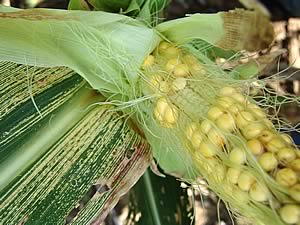 |
|||||||||
|
|||||||||||||||||||
|
|
First
All-African GM Crop is Resistant to Maize Streak Virus 15/08/07 The first all-African genetically modified crop plant with resistance to the severe maize streak virus (MSV), which seriously reduces the continent’s maize yield, has been developed by scientists from the University of Cape Town and PANNAR PTY Ltd, a South African seed company.
The research, published in Plant
Biotechnology Journal represents a significant advance in African agricultural
biotechnology, and will play an important role in alleviating
Africa’s food shortages and famine. Dr Dionne Shepherd, lead researcher explains, “MSV
is transmitted to maize by small insects called leafhoppers.
The disease is therefore a result of a complex interplay
between the plant, the virus and insect. Factors that can
influence the severity of the disease include the age at
which the plant is infected (the younger the plant, the
more severe the infection), the maize variety (some are
more susceptible than others), and environmental conditions. “We have created an MSV-resistant maize variety
by genetic engineering, using an approach known as pathogen-derived
resistance. This means that a gene from the viral pathogen
is used to protect the plant from that pathogen. We mutated
a viral gene that under normal circumstances produces a
protein that is essential for the virus to replicate itself
and inserted it into the maize plant’s genome, creating
genetically modified maize. When the virus infects one
of these transgenic maize plants, it displays a significant
delay in symptom development, a decrease in symptom severity
and higher survival rates than non-transgenic plants.” The next stage of the research involves field trials to ensure that the transformed crop is digestible, that the protein is not an allergen and that it will be ecologically friendly to other organisms within the environment. Following the results of these trials, the crop will be monitored over a number of growing seasons before it is made accessible to local farmers.
|
||||||||||||||||||

|
|
||||||||||||||||||
| home | agri-services | pedigree
pen | news | dairy | beef | machinery property | organisations | site map |
|||||||||||||||||||

